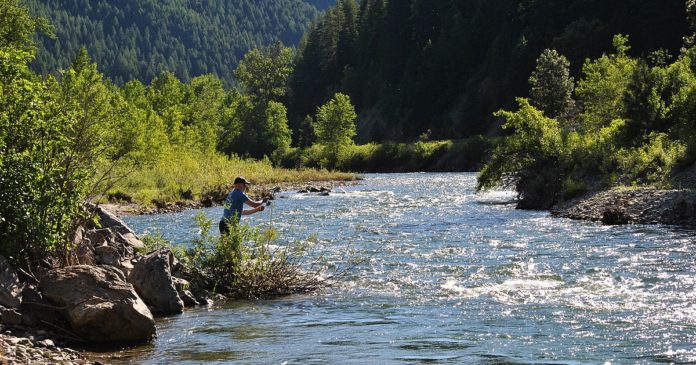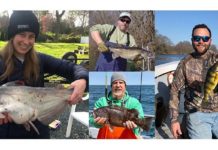While Mineral and Sanders counties haven’t faced serious flooding like other parts of Montana this June, high water levels on area rivers are still keeping sportsmen from casting their poles at this point. And although fishermen are impatiently waiting on the shorelines for water levels to recede, this later spring runoff is actually on the more normal scale.
Ladd Knotek, Montana FWP Fisheries Biologist, explained, “The flow rates are just about two or three weeks later than we are typically used to seeing. They’re not necessarily extreme, it’s just late to us. Normally we’ve had earlier peaks than traditionally observed, in late May and early June.”
He continued, “This is a more typical historical peak, early June into the second week, not the usually peak runoffs we have been used to seeing in the past few decades in late May.”
Western Montana had a very cool, wet, and snowy May and early June in the higher elevations, this boosted mountain snowpack levels and also improved some short-term fire outlooks. On June 6, the USDA Natural Resources Conservation Service released their current SNOTEL map of the state, reflecting snow water equivalents percentages. For Mineral County, the Lower Clark Fork region was sitting around 205 percent above normal.
Which is something we are seeing for all the western side of the divide. But in contrast, other areas to the east remain in moderate to severe drought. So Knotek considers the high flow rates as favorable.
He remarked, “It really bodes well, hopefully we don’t get into the same hot dry drought pattern that we’ve been seeing the last four or five years with things getting pretty dried out and water stream flows getting low by the end of July and August.”
During the month of June, the U.S. Geological Survey tracked flow rates for the St. Regis and Clark Fork Rivers well above average. Discharge is measured in cubic feet per second, CFS. For the last two weeks flow rates for the St. Regis River have been about 600 CFS above the 44-year median. The first few days of June the water levels were near normal. This same time last year the Clark Fork River was well below its median level, compared to now we are seeing streamflow conditions close to double.
For the past several summers when local rivers and creeks run low and warm, the FWP has had to enforce Hoot Owl Restriction. Only permitting fishing during the coolest parts of the day, before 2 p.m.
In regards to fish health, murky, high, and fast water levels are healthier for them than the alternative. Knotek noted, “Fish are pretty adaptable overall, it’s better for them as well, the flow levels and water temps will be less extreme if this pattern continues, they may be muddy or turbid now, but it still translates into more water and cooler water temps for the summer ahead.”
One local angler and guide, Steve Temple, has his fingers crossed for the weeks ahead.
Owner of Clark Fork Trout, a fly-fishing shop in St. Regis Temple has been fishing and guiding on the waters of western Montana since 2007.
So, you could say he’s quite familiar with spring run offs, and the guessing game of when area rivers will become fishable. He detailed, “It’s been really uncertain up to this point. The waters pick up and then drop back, it’s not a very predictable run off this year, so it’s any guess on what’s gonna happen in the next week.”
Up until this point Temple’s fly shop in St. Regis is usually closed. He reckoned, “There’s really no reason to have it open without fishermen around.”
Temple said, “There is so much turbidity in the water right now, we are just having to wait a bit.” And for him waiting means fishing up in Alaska for Salmon during this stage. He added, “This time of year, we are normally on the side lines until about the 28th that is when we can usually start to fish.” Or at least he hopes so, Temple’s first float trip for the season is that day. But he projected, “We are about a week to ten days out I think, there is still so much high-country snow and some hot weather coming up.”
Take advantage of this quiet season and find some other projects, but Temple stated, “The minute the rivers get fishable it is full throttle from then on, everybody is hitting them and the rest of summer stays very busy.”
Knotek encouraged the same, “I know there are lots of people chomping at the bit to get out there, but wait it out two to three weeks, and I think the conditions will be much improved, there’s still plenty of snow up high.”
As for future fishing plans Knotek recommended lower elevation lakes in neighboring counties.
Spot like Browns Lake and Georgetown, Seeley, and Salmon. He detailed, “Low and mid elevation lakes are fishing well, but the high elevation lakes, are almost there. And the only river and streams that are fishable at the moment are the ones below lakes outlets because they are running clear.”
To monitor streamflow rates and water levels on area waterways visit the nwis.waterdata.usgs.gov/mt website. And always keep up on current fishing regulations and fishing conditions through the Montana Fish Wildlife and Parks.
Credit: Source link































